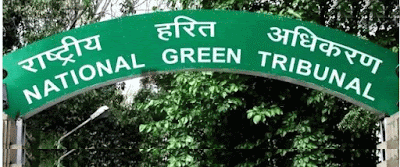National Green Tribunal Act, 2010 (NGT) is an Act of the Parliament of India which enables creation of a special tribunal to handle the expeditious disposal of the cases pertaining to environmental issues. It was enacted under India's constitutional provision of Article 21, which assures the citizens of India the right to a healthy environment.
The National Green Tribunal was established under Section 3 of the National Green Tribunal Act, 2010 (No. 19 of 2010 and came into force on 18th of October 2010) for the effective and expeditious disposal of cases relating to environmental protection and conservation of forests and other natural resources including enforcement of any legal right relating to environment and giving relief and compensation for damages to persons and property and for matters connected therewith or incidental thereto.
The Tribunal's dedicated jurisdiction in environmental matters shall provide speedy environmental justice and help reduce the burden of litigation in the higher courts. The Tribunal shall not be bound by the procedure laid down under the Code of Civil Procedure, 1908, but shall be guided by principles of natural justice. The Tribunal is mandated to make and endeavour for disposal of applications or appeals finally within 6 months of filing of the same. Initially, the NGT is proposed to be set up at five places of sittings and will follow circuit procedure for making itself more accessible; New Delhi is the Principal Place of Sitting of the Tribunal and Bhopal, Pune, Kolkata and Chennai shall be the other 4 place of sitting of the Tribunal.
Jurisdiction:
The Tribunal has Original Jurisdiction on matters of “substantial question relating to environment” (i.e. a community at large is affected, damage to public health at broader level) & “damage to environment due to specific activity” (such as pollution). However there is no specific method is defined in Law for determining “substantial” damage to environment, property or public health. There is restricted access to an individual only if damage to environment is substantial. The powers of tribunal related to an award are equivalent to Civil court and tribunal may transmit any order/award to civil court have local jurisdiction.The Bill specifies that an application for dispute related to environment can be filled within six months only when first time dispute arose (provide tribunal can accept application after 60 days if it is satisfied that appellant was prevented by sufficient cause from filling the application).
Also Tribunal is competent to hear cases for several acts such as Forest (Conservation) Act, Biological Diversity Act, Environment (Protection) Act, Water & Air (Prevention & control of Pollution) Acts etc. and also have appellate jurisdiction related to above acts after establishment of Tribunal within a period of 30 days of award or order received by aggrieved party. The Bill says that decision taken by majority of members shall be binding and every order of Tribunal shall be final. Any person aggrieved by an award, decision, or order of the Tribunal may appeal to the Supreme Court within 90 days of commencement of award but Supreme Court can entertain appeal even after 90 days if appellant satisfied SC by giving sufficient reasons.
To check pollution, NGT for variable office hours
The Tribunal also pulled up the Delhi government for failing to set up check posts at nine entry and exit points of the capital, as per its directions.
The National Green Tribunal (NGT) has suggested variable office hours for the government and private sector in Delhi to reduce vehicular pollution during peak hours and asked the government to deliberate with stakeholders on the suggestion.
It also asked the Noida Authority, Ghaziabad Development Authority and state governments of Delhi, Haryana and UP to file status reports on its directions. The stay on the Tribunal order banning plying of over10-year-old diesel vehicles would continue till the next date of hearing.
The NGT bench asked the Centre to adopt innovative measures to tackle air pollution, while directing it to file a status report on the compliance of previous directives. While asking the Centre to deliberate on the idea of “variable working hours” with all stakeholders, the Tribunal said, “Variable working hours could be a solution. Courts and government offices in Delhi open at 10 am and, if we have a gap of one or two hours, this will help in reducing vehicular emissions immensely… Even business establishments’ working hours could be regulated.”
Additional Solicitor General Pinky Anand said that existing laws were sufficient but the need was for “effective implementation” and “long-term measures”. She added that steps were being taken to reduce air pollution in compliance with the Tribunal’s order.
The Tribunal also asked the Centre to submit a report about the implementation of its previous directions and the pollution percentage, in terms of dust, vehicles and burning of materials. It also asked the Centre to specify its view regarding the life of a vehicle, in terms of pollution emanating from its emissions.

No comments:
Post a Comment